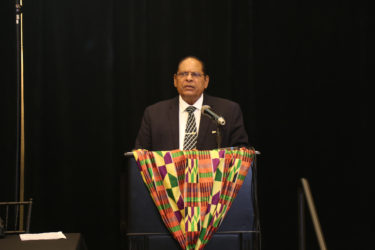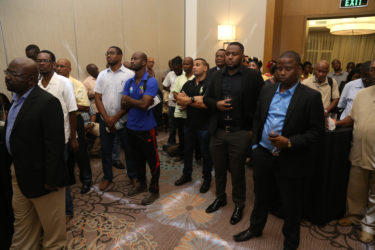The economic empowerment of Guyanese of African descent requires a collective effort and this is the impetus behind the founding of the African Business Roundtable (ABR) by the African Cultural and Development Association (ACDA).
The ABR, which was launched at the Marriott Hotel last evening, seeks to create business opportunities for people of African descent, facilitate access to markets, openings to financing and stimulate opportunities for self-development and the transformation of villages into viable economic centres.
It has been constituted as part of the national effort to achieve the objectives contained in resolutions A/Res/68/237 and A/Res/69/16 of the United Nations General Assembly in respect of the international decade for people of African Descent and the Programme of Action thereof and in

particular a call for “specialised agencies… including organisations of people of African descent …to develop and implement specific action-oriented activities in their areas of competence.”

One of the founding members of the ABR, Charles Ceres, told Stabroek News that the basic intention is to represent the collective.
“We are looking to represent a collective and not individuals,” he said, before explaining that African descendants are a historically marginalised people and the only way for this marginalisation to be corrected “is if we are represented by a collective presenting the perspective of African Guyanese and not individuals.”
Towards this end, the ABR also seeks to create an enabling environment for the creation of training, opportunities and the collection, compilation, analysis, dissemination and publishing of reliable statistical data for business decision-making.
ACDA’s Eric Phillips, who is also a founding member, explained that this initiative is essential as African and African mixed persons form more than 50% of Guyana’s population yet own less than 5% of the country’s GDP.
“Approximately 375,000 persons own less than 5% of Guyana’s GDP. In stark contrast, another ethnic group, who came 200 years after Africans and who comprise less than 3,000 persons, own more than 10%… because of historical legacies of empowerment by the British and significant economic affirmative action. This is a gross injustice and there has to be social justice and equity,” he said.‘Laudable’
Prime Minister Moses Nagamootoo, performing the functions of President, noted that while the initiative has been launched modestly, it ought to be applauded. He noted that government encourages the ABR to pool their resources and overcome the challenges of inequality present in Guyana.
Nagamootoo did not shy away from the controversy that could possibly stem from the launching of the ABR and told those gathered that his words of encouragement might be misconstrued by some to suggest that he has abandoned his own ethnic roots as an Indo-Guyanese.
He maintained that it is possible to be proud of and supportive of your own ethnic group without compromising your patriotism.
“We all have pride in our ethnicity but while we are proud of our ethnicity, the source of our identity is our nationality. We are Guyanese, there is no conflict between our ethnicity and nationality,” he said as he shared his experiences with the increasing number of ethnically-based business cooperatives around the world.
Nagamootoo’s ack-nowledgment of the challenges which will face the ABR followed that of founding member Osafa George, who told the gathering that “in a society as racial and politically divided as ours, there will be an outcry at the formation of this group, there will be challenges ahead.”
He asked the audience to seriously consider what should be done “when a society yearns for and accepts the value of inclusion and social cohesion but rejects the tough steps needed to bring about inclusion and participation.”
“Almost every Guyanese knows that black-owned businesses are underrepresented and often marginalised. Most who embrace social cohesion believe this is wrong yet when we take meaningful steps to correct this, it will cause push back,” George stated before advising that “in order to unleash the full potential of our country, it involves unleashing the potential of all groups marginalised. We must have a level playing field and equality of opportunity for all.”





